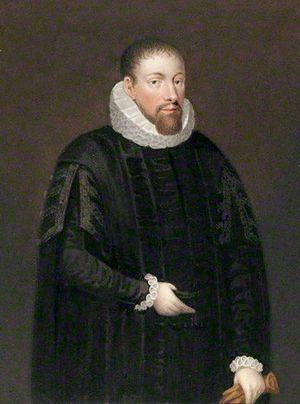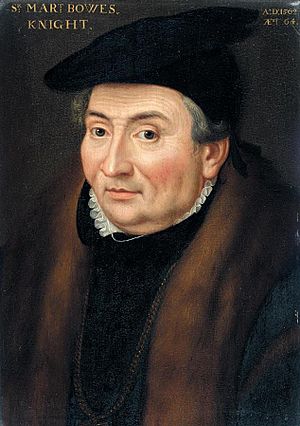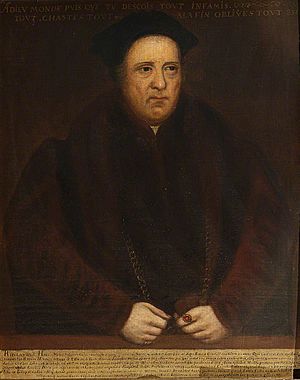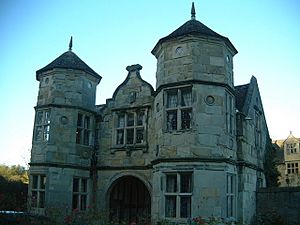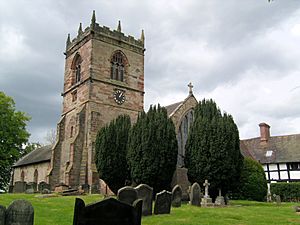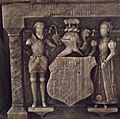Robert Broke facts for kids
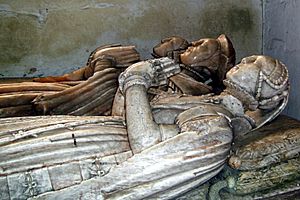
Sir Robert Broke (died 1558) was an important English judge, politician, and legal writer. Even though he owned land in rural Shropshire, he became very successful through more than 20 years of work for the City of London. He was a Member of Parliament (MP) for the City in five different parliaments. He even served as the Speaker of the House of Commons in 1554. He is well-known for writing one of the most important law books of his time. Broke was also a strong supporter of the traditional Catholic religion and started a family line known for keeping their faith during difficult times. His name is sometimes spelled Brooke or Brook.
Contents
Early Life and Schooling
Robert Broke was born around 1515. He was the oldest son of Thomas Broke from Claverley in Shropshire, and Margaret Grosvenor. In the early 1500s, Shropshire was mostly a poor area known for sheep farming.
Broke began studying at Oxford University in 1521. Since his family wasn't very wealthy, he needed to find a way to earn money outside his hometown. He chose to work in London and study law. He first studied at Strand Inn and then at Middle Temple between 1525 and 1528. He learned about legal arguments from John Jenour, a famous legal expert who taught many future judges.
Broke's Career as a Judge
Before becoming a high-ranking judge in his last four years, Broke had a lot of power as an official for the City of London. He also wrote several important books about law.
Important Jobs He Held
Broke's career in law began in 1536. He was chosen as the Common Serjeant of London. This was a special job suggested by King Henry VIII and Queen Jane Seymour. It's not clear how he became so favored by the King. As Common Serjeant, Broke worked closely with the Lord Mayor of London and helped with the city's main decision-making groups. One of his jobs was to check and rewrite new laws proposed by the city for Parliament.
In 1545, the job of Recorder of London became open. The King again wrote a letter to the city leaders, which helped Broke get this important position. He started the job on November 12. A few days later, he was elected to Parliament. He also became a member of the Worshipful Company of Mercers, one of London's most important trade groups.
Even with these public jobs, Broke also worked as a private lawyer. He was also a deputy chief manager for the Duchy of Lancaster. In 1552, he became a Serjeant-at-law, a very senior lawyer.
On October 8, 1554, he was made Chief Justice of the Common Pleas. This was likely a reward from Queen Mary for his good work as Speaker of the House of Commons. He was knighted by King Philip on January 27, 1555.
His Legal Writings
In 1542, Broke became a senior member at the Middle Temple. He gave lectures on law, and his notes were later printed as books. His most important book was called La Graunde Abridgement. This book was a huge collection of laws from his time, organized by topic. It was similar to a book by Anthony Fitzherbert. Broke's book included many cases he had worked on and focused a lot on London and the role of Parliament.
The book was published in 1568, ten years after Broke died. It was written in Law French, a special legal language. It quickly became very popular and was seen as one of the "Books of Authority." This meant courts could use it as proof of what the law was. Later, another lawyer, Richard Bellewe, took important cases from Broke's book and published them separately. This new collection, often called Brook's New Cases, became even more popular.
Broke's Political Life
Broke served as a Member of Parliament for the City of London from 1545 to 1554. He was also the Speaker of the House of Commons in 1554.
Parliament of 1545
Broke was elected to Parliament in 1545, during the last years of King Henry VIII's rule. He took the place of Sir Roger Cholmley. London had four MPs. Broke's election was automatic because he became the Recorder of London. London was very important in creating new laws, so skilled lawyers like Broke were always needed in Parliament.
Broke and his fellow MPs worked to protect the City of London's interests. They tried to pass a bill about city safe havens, but it didn't succeed. However, they did manage to reach a compromise on a bill about collecting church taxes from citizens. This kind of work was typical for London MPs during the Tudor period.
Parliament of 1547
Broke was automatically re-elected to the first Parliament of Edward VI. His colleague was Sir Martin Bowes, a goldsmith who had been Lord Mayor. A big concern for London MPs was making sure the city kept control of the wealth from church properties that were being closed down. Broke knew a lot about this, as he had helped with a survey of these properties in 1546.
Broke's skills as a lawyer were also useful to the King and his ministers. He helped with various bills, including one about different religious opinions in 1549. In 1552, he helped rewrite the Treason Act 1551 to make it illegal to say the king was a "heretic" or "usurper." He also advised powerful nobles on their legal issues.
Parliament of March 1553
Broke and Bowes were sent to the last Parliament of Edward VI's reign. This Parliament met for only one month in March 1553, as the question of who would be the next ruler was becoming very important. The London MPs first focused on regulating fuel use in London, which they succeeded in doing.
Broke was also asked to look into an election issue in Maidstone. The town had recently been given a special charter, but it didn't mention if they could send MPs to Parliament. Broke and another judge, Richard Morgan, were told to check Maidstone's charter. It's thought that supporters of John Dudley, 1st Duke of Northumberland might have used Maidstone's unclear status to get more support for Lady Jane Grey to become queen. Maidstone lost its right to send MPs until 1559.
Parliaments of Mary I
In the Parliament of October 1553, Broke was the only Catholic MP from London. Even with the big changes happening, the London MPs focused on business matters. They worked on laws about London's doctors, candle makers, leather tanners, and bowling alleys. They also worked on a law to make selling wine easier. However, the Queen began to reverse the Protestant changes. Broke helped review and guide a bill to repeal the Treason Act, which he had helped write earlier.
The Parliament of April 1554 had a clear goal: to support the Queen's Catholic changes and her marriage to Philip II of Spain. Broke was elected Speaker of the House of Commons, likely with the Queen's support. This Parliament lasted only a month. As Speaker, Broke's main job was to guide a bill that would protect people who had gained land from the closed monasteries from church punishment. He did this well, even though the bill didn't pass in the House of Lords. The Queen's main goals, especially about her marriage, were quickly approved. Broke's good work as Speaker likely led the Queen to give him a high position in the judiciary. He was appointed Chief Justice of Common Pleas before the next Parliament met, which meant he had to give up his MP seat.
Land Ownership
Broke's family had been minor landowners in Shropshire. However, his successful career gave him the connections and money to buy a lot more land. He was able to buy land and rights that had been taken from monasteries during the reign of Henry VIII and from other religious groups during Edward VI's reign.
The most important purchase for Broke's family was the manor of Madeley, Shropshire. This land had belonged to Wenlock Priory. After the priory closed in 1540, Broke bought Madeley in 1544. For two centuries, Madeley was the main home of the Brooke family. Madeley was already known for its coal mining since the 1300s and had iron ore workings. It later became a key place in England's Industrial Revolution.
In 1548, Broke also bought the manor of Lapley. This land had belonged to Lapley Priory. Broke bought it from Sir Richard Manners and gave it to his second wife, Dorothy Gatacre, when they married. She received it after his death.
Broke's family usually lived in Shropshire. He visited his family and friends there, but he mostly lived in one of his houses in London.
His Religious Beliefs
Most people agree that Broke was a Catholic. He was even described as a "zealous Catholic." In 1548, it was reported that he and another MP smiled when a priest prayed for the King's Council to change their "wrong opinions."
Broke's strong Catholic beliefs were a constant part of his life. In 1541, he helped with a commission to investigate heresy in London, when Henry VIII was persecuting Protestants. However, like other landowners in Shropshire, Broke didn't always agree with the power and wealth of the clergy. He worked to limit the power of London's clergy and later gladly accepted lands taken from monasteries and other church groups. He even used his power as Speaker to try and secure these land purchases.
Broke was also very professional in his work. He would use his legal skills for clients no matter their religious views. For example, he worked on both the creation and the repeal of the 1551 Treason Act, which made it illegal to criticize Edward VI's religion. He married within his Catholic circle. His family, the Gatacres, and his own descendants became known as recusants, meaning they refused to attend Church of England services.
His Death
Records show that Broke died on September 5, 1558, at Patshull Hall. However, his tomb says he died on September 6, while "visiting his friends and country." The difference is small, and he might have died during the night. He was buried in Claverley Church. His tomb is the finest in the church. It shows him in his judge's robes, lying between his two wives, with small figures of his children around the sides.
- The Broke tomb in All Saints Church, Claverley
Broke's will was written on January 7, 1558. His estates were divided between his two oldest sons, John and Richard. His widow, Dorothy, received Lapley and kept Madeley until her death. His other sons were given money, with the condition that they study or learn a trade suitable for a gentleman's son.
His Family
Broke was married twice and had seventeen children in total. His wives were:
- Anne Waring: She was the daughter of Nicholas Waring of Shrewsbury. She was also the widow of Nicholas Hurleston, a former MP. Broke married Anne by 1537. She had his oldest son, John, and at least three other children before she died.
- John Brooke inherited Madeley, Broke's most important estate. He received it after Dorothy Gatacre died around 1572. He passed away in 1598.
- Basil Brooke (1576–1646) was John's son and Robert's grandson. He was a Royalist who plotted against the government and was known for his wit. He was also an important iron producer. Because of his Catholic faith, he faced financial difficulties, which led him to develop the industrial potential of the Madeley estate. He set up ironworks and even a steelworks at Coalbrookdale.
- John Brooke inherited Madeley, Broke's most important estate. He received it after Dorothy Gatacre died around 1572. He passed away in 1598.
- Dorothy Gatacre: She was the daughter of William Gatacre. Broke married Dorothy in 1544. She lived about 14 years longer than Broke. They had at least four daughters and five sons, including:
- Richard Brooke, who inherited some of Broke's property as the oldest son from this marriage.
 | Misty Copeland |
 | Raven Wilkinson |
 | Debra Austin |
 | Aesha Ash |


